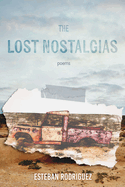
The moving vignettes in Esteban Rodríguez's ninth poetry collection, The Lost Nostalgias, contrast the hardships and accomplishments in his Mexican American family's history.
Looking back on his Texas upbringing, Rodríguez (Lotería) feels a mixture of pride and shame. "Tongue" notes how, as a teenager, he was critical of his parents' occasional difficulties with the English language ("esplain," "breatheded"). He wishes he had been more tolerant, of his mother in particular: "I should have cared less about,/ because didn't her attempts count,/ didn't her Congrachoolashuns mean// what it meant all along?"
But he also admires his parents' hard work and tenacity. "Herbalife" recounts his mother's sales endeavors; "Payback" and "Cure" recall how she was "always ready/ for an emergency," quick to set her son's dislocated shoulder or treat his congestion with a combination of prayer and VapoRub. Meanwhile, in "Home," his father's indefatigable manual labor eventually funded their house in the suburbs: "a decade of construction sites,// sixty-hour work weeks, and of bearing/ the bright beatings from the sun had finally/ paid off."
Body parts are repeated symbols of life's wear and tear: Rodríguez's mother's teeth remind him of "some old country curse--// a generational spell of cavities and plaque"; and feet are troublesome for multiple relatives. Rodríguez creates enrapturing rhythms through alliteration and recurrent vocabulary--sometimes an incidental word from one poem serves as the title of the next--and even finds beauty in a scrapyard ("Landlocked") or a rest stop ("Bluebonnets"). Lyricism gilds the everyday--memory, health, and landscape--with grace. --Rebecca Foster, freelance reviewer, proofreader and blogger at Bookish Beck

